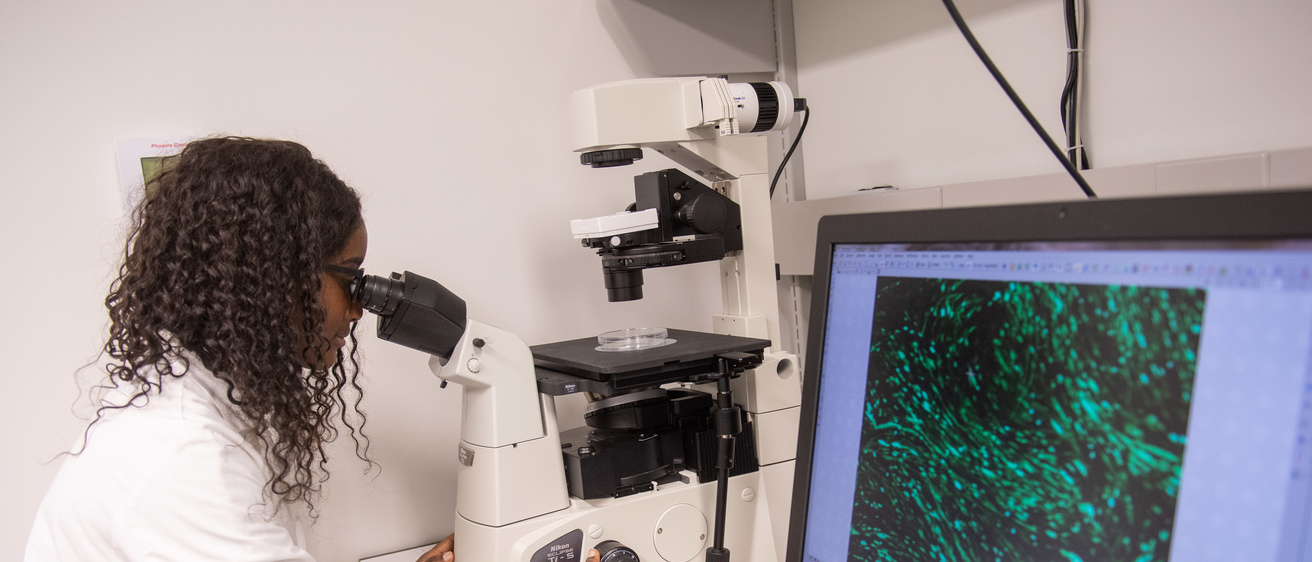Biology is at the heart of some of today’s biggest opportunities and challenges, such as developing products related to human health, understanding the relationships among the many species that inhabit Earth, and managing human impacts on the environment.
Biology is the study of life, and advances in the understanding of living systems impact almost every aspect of modern life. From food to biofuel to medicine, biological applications are integral to modern society and further advances will be necessary to address the challenges that the future holds.
An undergraduate degree in Biology offers diverse career opportunities and also is excellent preparation for graduate or professional school. The explosion of interest in biotechnology and synthetic biology, including genome sequencing, stem-cell research, recombinant DNA studies, and nuclear cloning, offers career opportunities unheard of even 10 years ago.
With more than 700 students, biology is one of Iowa's most popular majors. The Department of Biology offers degree programs that provide a solid foundation in modern biological sciences as well as specialized tracks of study.
Through a combination of its flexible curriculum and student access to leading research faculty, the department offers excellent preparation for a biosciences career, graduate study in the biological sciences, or professional study in the health sciences.
Biology students can get acquainted with the activities of practicing scientists by working in one of the department’s research groups, conducting laboratory experiments, discussing current research, studying specialized topics, and attending seminars.
Students interested in field biology, zoology, or botany may take varied courses in those subjects offered during the summer at Iowa Lakeside Laboratory.
Biology faculty members are advancing knowledge in specialized fields, such as molecular genetics, neurobiology, cell and developmental biology, plant sciences, and evolution.
Students interested in this major need to meet the requirements for admission to the College of Liberal Arts and Sciences.
Information
Iowa graduates have a 95 percent job/grad school placement rate within six months of graduation. Our Pomerantz Career Center offers multiple resources to help students find internships and jobs.
The Biology major provides a strong foundation for graduate study or careers in a wide variety of fields such as the health sciences, biological research, biotechnology, forensics, public health, natural resources, and education.
In addition to more than 500 student organizations, Iowa students choose from more than 100 study abroad programs and multiple undergraduate research opportunities.
Biology students have the opportunity to participate in cutting-edge research and learn research techniques directly from the faculty and their research groups on campus.
Students in the Biology Honors Program conduct research with a faculty member in the Department of Biology. With guidance from their faculty advisor, Biology Honors students write a research proposal and thesis and present their research findings to members of the Biology department as part of a student colloquium. Alternatively, students may choose to perform research with faculty in departments outside the Biology department and earn academic credit.
The University of Iowa provides a variety of scholarships to eligible undergraduate students through the Iowa Scholarship Portal. Scholarships are available to first-year, transfer, and currently enrolled students. For additional details on scholarships for your program of study, check directly with the department or college.
The Office of Admissions and the Office of Student Financial Aid are great resources for students seeking scholarships.
Both degree programs prepare students to work in many areas, including health care, industry, biotechnology, research, and education, and both provide a solid foundation for graduate study.
BA and BS students take a common set of courses in the basic sciences of Biology, chemistry, biochemistry, and mathematics, but their remaining requirements are different.
The BA program is a good choice if you're interested in teaching secondary school science as it offers a broad range of Biology courses and can be combined into a five-year MAT program with the College of Education. BA students study genetics, evolution, cell biology, and additional Biology courses, along with electives offered by other departments.
The BS program offers more specialized study and is good preparation for a future in research or medicine. BS students choose from one of four tracks:
- Cell and Developmental Biology—examines the structure and function of cells and the principles of development related to animals and plants
- Genetics and Biotechnology—looks at key principles of gene transmission, maintenance, regulation, and manipulation
- Integrative Biology—provides a well-balanced introduction to all of the major fields of Biology
- Neurobiology—teaches about nervous system function at all levels, from molecular to systems biology
In addition to coursework required for the major, all students must complete the College of Liberal Arts and Sciences GE CLAS CORE requirements.
Teaching Licensure
Students planning to teach in secondary schools will need to complete the College of Education's Teacher Education Program and work closely with an advisor.
Students with an interest in teaching may participate in a teaching internship for academic credit. Internship options include teaching in a general education Biology course, the first-semester Biology course for science majors, or an advanced investigative lab course.



